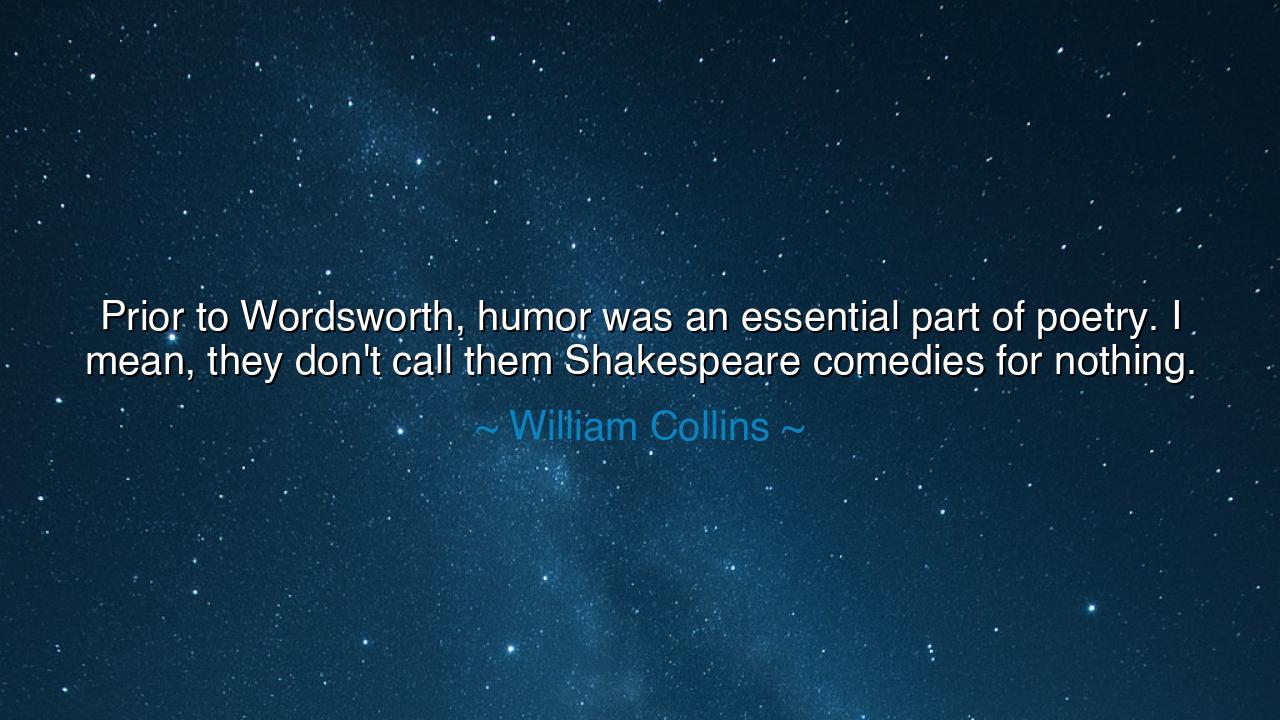
Prior to Wordsworth, humor was an essential part of poetry. I
Prior to Wordsworth, humor was an essential part of poetry. I mean, they don't call them Shakespeare comedies for nothing.






The words of William Collins—“Prior to Wordsworth, humor was an essential part of poetry. I mean, they don’t call them Shakespeare comedies for nothing”—resonate like a gentle rebuke to the modern soul, reminding us that art was once alive with laughter as well as longing. Beneath their wit lies a lament for what has been lost: the ancient harmony between joy and beauty, between the playful and the profound. Collins, a poet himself, speaks not only as a critic of Wordsworth’s solemn romanticism but as a guardian of a forgotten truth—that humor, far from diminishing poetry, once gave it light, humanity, and wholeness.
To say that humor was an essential part of poetry is to recall a time when verse was not confined to melancholy reflection, but encompassed the full range of human experience. Before Wordsworth’s rise in the early 19th century, poetry was not merely the voice of the heart—it was the laughter of the village, the wit of the court, the dance of language itself. The ancients, from Homer to Horace, wove jest and irony into their lines as naturally as breath. Even Shakespeare, whom Collins evokes with reverence, blended tragedy with laughter, knowing that the soul cannot bear unbroken sorrow. His comedies—A Midsummer Night’s Dream, Twelfth Night, Much Ado About Nothing—were not frivolous entertainments, but luminous studies of human folly, redeemed by humor. They remind us that to laugh is not to mock life, but to love it.
The origin of Collins’s insight lies in the transformation that occurred with William Wordsworth and the Romantic movement. Wordsworth, in his pursuit of purity and emotional truth, sought to lift poetry into the realm of introspection and nature’s solemn majesty. He believed that poetry should arise from “emotion recollected in tranquility,” and so his verses often gazed inward, seeking divinity in solitude. In doing so, he altered the course of poetry forever—but he also, perhaps unknowingly, stripped it of one of its oldest companions: humor. The poetic voice, once rich with irony, satire, and laughter, became weighted with reverence and reflection. Collins’s observation, then, is both historical and philosophical—a reminder that art loses something vital when it forgets to smile.
Consider the figure of Geoffrey Chaucer, the father of English poetry. In The Canterbury Tales, he mingled sacred pilgrimage with bawdy jest, moral truth with human imperfection. His laughter was not cruel but compassionate, born of deep understanding. He saw that humor is not the enemy of virtue, but its mirror. Through laughter, he revealed the vanity and nobility of mankind in equal measure. Like a wise elder, he taught that to find the divine in humanity, one must first accept its absurdities. In this spirit, Collins’s quote calls us back to the balance Chaucer knew so well—the union of wit and wisdom.
Even in the ancient world, this truth was honored. The philosopher Aristophanes, in his comedies, used laughter as a weapon of truth, exposing corruption and folly while keeping the joy of life intact. For him, humor was a form of philosophy, a way to pierce illusion without hatred. The Greeks understood that the gods themselves laughed, and that to be divine was not to reject joy, but to dwell in it. Collins’s lament, therefore, is not simply about Wordsworth or Shakespeare—it is about the eternal struggle between solemnity and delight, between the sacred and the human.
Humor, as Collins suggests, is not a lesser art—it is a form of grace. It invites humility, reminding poets and readers alike that beauty is found not only in suffering and grandeur, but in the laughter that redeems them. The poet who cannot laugh at himself risks pride; the reader who cannot laugh at life risks despair. In this way, humor becomes a moral force, an act of mercy toward existence. Collins’s reverence for Shakespeare’s comedies reflects this belief: that humor, when guided by insight, transforms folly into understanding and pain into perspective.
Let this be the lesson for those who create, speak, or live with seriousness of heart: do not banish laughter from your art or your life. The universe itself was born not in silence, but in song; even in sorrow, there is rhythm and release. To live without humor is to live without balance, to see the world only in shadow when it was made for light. Reclaim the laughter of the ancients—the laughter that does not wound but heals, that does not mock but reveals.
So, as William Collins reminds us, remember the poets who came before Wordsworth—the ones who laughed as they wrote, who loved the world enough to smile at its absurdity. For humor, rightly understood, is not the denial of depth, but its completion. It is the soul’s way of saying: Life is heavy, but I will dance with it still.






AAdministratorAdministrator
Welcome, honored guests. Please leave a comment, we will respond soon